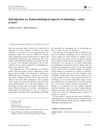 101 citations,
April 1994 in “Baillière's clinical endocrinology and metabolism”
101 citations,
April 1994 in “Baillière's clinical endocrinology and metabolism” 5α-reductase is essential for male sexual development and its inhibitors have potential in treating various conditions related to hormone action.
 11 citations,
January 2019 in “Sexual Medicine”
11 citations,
January 2019 in “Sexual Medicine” Younger transgender women have surgery earlier, are mostly attracted to men, and show more preoperative depression that improves after surgery compared to older transgender women.
5 citations,
June 2018 in “Elsevier eBooks” Testosterone is important for male sexual traits, reproduction, muscle and bone health, blood production, and metabolism, and works both directly and after being changed into other hormones.
3 citations,
December 2014 in “Elsevier eBooks” Male hormones and their interactions are crucial for male sexual development and characteristics.
 1 citations,
September 2015 in “Reviews in Endocrine and Metabolic Disorders”
1 citations,
September 2015 in “Reviews in Endocrine and Metabolic Disorders” The document discusses new insights into how hormones affect male sexual health and related conditions.
 32 citations,
February 2016 in “Journal of Dermatology”
32 citations,
February 2016 in “Journal of Dermatology” Dutasteride safely promotes hair growth and reduces hair loss, with mild side effects.
 7 citations,
November 2009 in “Journal of the American Geriatrics Society”
7 citations,
November 2009 in “Journal of the American Geriatrics Society” Finasteride may help reduce inappropriate sexual behaviors in dementia patients with prostate issues.
 1 citations,
May 2023 in “Cell reports medicine”
1 citations,
May 2023 in “Cell reports medicine” Sons of mothers with polycystic ovary syndrome (PCOS) have a higher risk of obesity and insulin resistance, possibly due to certain genes and factors passed down from their mothers.
 November 2023 in “Current Dermatology Reports”
November 2023 in “Current Dermatology Reports” Oral minoxidil is effective for various hair loss types and may improve male sexual function, but aspirin can reduce its effectiveness.
 187 citations,
January 1994 in “The New England Journal of Medicine”
187 citations,
January 1994 in “The New England Journal of Medicine” Finasteride treats enlarged prostate and may help with baldness, but effects on sexual function and male fetuses are unclear.
 70 citations,
April 2014 in “Annales d'endocrinologie”
70 citations,
April 2014 in “Annales d'endocrinologie” New genes and pathways are important for testosterone production and male sexual development.
 38 citations,
October 2014 in “Current Opinion in Endocrinology, Diabetes and Obesity”
38 citations,
October 2014 in “Current Opinion in Endocrinology, Diabetes and Obesity” 5-alpha reductase deficiency leads to male sexual development issues and treatments like finasteride help with prostate enlargement and hair loss.
 24 citations,
October 2016 in “Oncotarget”
24 citations,
October 2016 in “Oncotarget” Finasteride has a higher risk of reproductive side effects than minoxidil.
 47 citations,
January 2021 in “Fertility and Sterility”
47 citations,
January 2021 in “Fertility and Sterility” COVID-19 might affect male fertility, but more research is needed to understand the full impact.
 14 citations,
January 2001 in “Primary Care Update for Ob/gyns”
14 citations,
January 2001 in “Primary Care Update for Ob/gyns” Primary care doctors should address female sexual dysfunctions to improve women's sexual health and life quality.
 36 citations,
September 2001 in “Journal of The European Academy of Dermatology and Venereology”
36 citations,
September 2001 in “Journal of The European Academy of Dermatology and Venereology” Finasteride doesn't reduce sexual function in people with hair loss.
 32 citations,
February 2019 in “Journal of neurochemistry”
32 citations,
February 2019 in “Journal of neurochemistry” Sex hormones affect brain injury differently in males and females.
 27 citations,
August 2015 in “Journal of Investigative Dermatology”
27 citations,
August 2015 in “Journal of Investigative Dermatology” The document concludes that there is a significant lack of reporting on the sex and age of cells in skin research, which could affect clinical trials and treatments.
 17 citations,
May 2021 in “Journal of Assisted Reproduction and Genetics”
17 citations,
May 2021 in “Journal of Assisted Reproduction and Genetics” COVID-19 may harm male fertility and damage the reproductive system.
 12 citations,
October 2004 in “Experimental Gerontology”
12 citations,
October 2004 in “Experimental Gerontology” Changes in testosterone and estrogen receptor genes can affect how men age, influencing body fat, hair patterns, and possibly leading to skin disorders.
 1 citations,
October 2020 in “Journal of The American Academy of Dermatology”
1 citations,
October 2020 in “Journal of The American Academy of Dermatology” Balding might help identify men at higher risk for severe COVID-19, but more research is needed.
July 2001 in “APMIS. Acta pathologica, microbiologica et immunologica Scandinavica./APMIS” Male children's genital development issues can be caused by genetic mutations or environmental factors affecting hormone action.
 156 citations,
October 1996 in “Science of The Total Environment”
156 citations,
October 1996 in “Science of The Total Environment” Tributyltin exposure causes sex changes, sterilization, and decline in the snail Ocinebrina aciculata, risking its extinction.
 11 citations,
March 2019 in “Journal of The American Academy of Dermatology”
11 citations,
March 2019 in “Journal of The American Academy of Dermatology” Some men taking finasteride for hair loss may experience sexual problems like erectile dysfunction and decreased sex drive, which can persist even after stopping the medication.
 September 2014 in “Springer eBooks”
September 2014 in “Springer eBooks” Men and women experience skin aging differently due to changes in sex hormone levels with age.
111 citations,
May 2001 in “Human reproduction update” Insufficient androgen action in male fetuses can cause genital development issues due to genetic mutations or environmental chemicals.
 77 citations,
May 2012 in “Expert Opinion on Emerging Drugs”
77 citations,
May 2012 in “Expert Opinion on Emerging Drugs” New treatments for male hypogonadism are effective and should be personalized.
 12 citations,
September 2017 in “Molecular and Cellular Endocrinology”
12 citations,
September 2017 in “Molecular and Cellular Endocrinology” Testosterone significantly affects sexual desire in both men and women, but its impact on women is more complex and influenced by psychological factors.
 September 2024 in “Health of Man”
September 2024 in “Health of Man” High uric acid can cause health issues, so managing it with lifestyle changes is important.
89 citations,
August 2013 in “PloS one” Androgen receptors are active in many tissues of both male and female mice, not just reproductive organs.

























